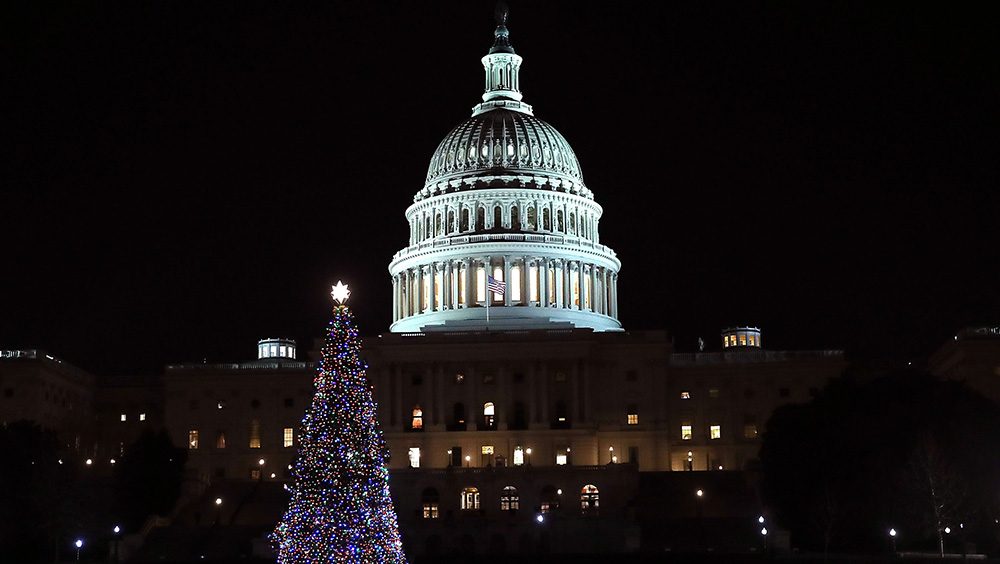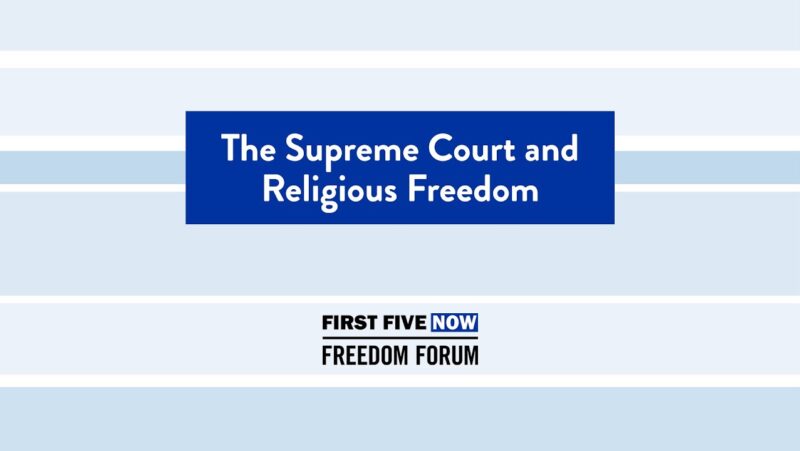Why Is Christmas a Federal Holiday?

When December rolls around so too does the annual debate about the role of Christmas in American public life.
In a country that separates church from state, many people wonder: Why is Christmas a federal holiday? Doesn't that violate the First Amendment?
We explore those questions — and many other frequently asked questions about Christmas as a federal holiday — below.
What does the First Amendment say about Christmas as a federal holiday?
The First Amendment’s establishment clause prohibits the government from favoring one religion (or nonreligion) over the other. This separation of church and state means the government cannot establish a state religion or “endorse” a particular religion.
And yet, Christmas is a federal holiday. Christmas, a day celebrating the birth of Jesus, whom Christians regard as the Messiah, is the only religious holiday with such status. Other major holidays, such as Yom Kippur (Jewish), Eid Al-Fitr (Muslim), and Diwali (Hindu), remain normal days on the federal government calendar.
So, what makes Christmas different? America is not a Christian nation, so why is Christmas a federal holiday? Is this even constitutional?
According to the courts: Yes, it is. Judges have ruled time and again that Christmas’ federal holiday status does not violate the establishment clause. But perhaps not for the reasons you think.
When did Christmas become a federal holiday?
Dec. 25 became a federal holiday in 1870. Before that, attitudes toward celebrating Christmas ranged from warm to openly hostile.
Not everyone living in early America celebrated Christmas. The Puritans, who fled from Europe to escape the Anglican Church, viewed Christmas as a sinful manmade holiday associated closely with Catholic customs. Celebrating the holiday was illegal and punishable by a five shilling fine.
In addition to the stern Puritans, many others who lived in early America were simply not Christian. Muslims, Jews and Native Americans had little affinity for Christmas.
Over time, attitudes toward celebrating Christmas warmed across the states, including ever-frigid New England. By the mid-1800s, Christmas was seen as a day of peace and rest. In 1870, President Ulysses S. Grant signed a bill creating four new holidays for federal workers, including Dec. 25.
Why did the U.S. government grant Christmas federal holiday status?
The First Amendment’s establishment clause prohibits the government from imposing one religion (or religion generally). So, by granting Dec. 25 federal holiday status, was the government attempting to impose Christianity on the American people?
No, says Elspeth Wilson, assistant professor of government at Franklin & Marshall College, who points to how the bill was passed. Dec. 25 was not the only federal holiday Grant’s signature created. The same bill granted federal holiday status to Jan. 1, Thanksgiving Day and the Fourth of July. Additionally, the official bill language did not decree “Christmas” as the federal holiday. Instead, the day was referred to as “December 25th … commonly called Christmas Day.”
Wilson notes two important details. First, Christmas was codified alongside multiple secular holidays. Second, the legal wording identified the holiday through its date, Dec. 25, not the religious name. For these reasons, she suggests that “Congress wasn’t trying to impose Christianity on people.”
Many historians agree with Wilson. Some believe the holidays were passed to create a sense of unity amid post-Civil War tensions. Others speculate it was to appease factory workers desperate for a day off, many of whom were burning out in the heat of the Industrial Revolution. According to Time magazine, it was primarily not the churches who petitioned to make Christmas a federal holiday, but rather businesses.
Regardless of intention, the bill passed Congress easily. And Grant made history by creating the first federal holiday with religious origins.

Do all Americans agree that Christmas should be a federal holiday?
No. In a country as religiously diverse as the United States, views on Christmas still vary widely. While approximately 85% of Americans celebrate Christmas in some form, that means 15% of Americans — or about 50 million people — do not. With that much diversity, there will naturally be a variety of opinions on the holiday.
Some Americans believe it is unconstitutional to have any religious day as a federal holiday. Others believe there is nothing wrong with recognizing a religious holiday, as long as the government doesn’t mandate religious observance. Alternatively, some believe we should keep Christmas as a federal holiday, but only if we give the same status to other traditions’ holidays, such as Diwali or Eid Al-Fitr.
Has anyone challenged Christmas’ federal holiday status?
Yes, but not successfully. In 1998, Jewish civil rights lawyer Richard Ganulin filed suit, arguing that Christmas’ federal holiday status violated the First Amendment. Among other constitutional arguments, Ganulin alleged that by making Christmas a federal holiday, the U.S. government:
- Created “a form of imposed assimilation and association on non-Christians,” making it difficult for non-Christians to “live in a way consistent with his beliefs and practices.”
- Reinforced stereotypes about what it means to be a true American and made a non-Christian feel “like an outsider and not an integral part of the political community in the United States.”
U.S. District Court Judge Susan Dlott rejected Ganulin’s argument and upheld the federal status of the holiday. She wrote a Dr. Seuss-style poem summarizing her opinion. An unusually festive addition to any court decision, the poem included clever rhymes such as “The Court will uphold seemingly contradictory causes, decreeing ‘the establishment’ and ‘Santa’ both worthwhile Claus(es)!”
Here are some of the reasons Judge Dlott said recognizing Christmas as a federal holiday does not violate the First Amendment.
There are no requirements on how to spend Dec. 25
The First Amendment prohibits the government from imposing any one religion on the people. But, as Dlott argued, merely giving federal workers the day off does not do that. Federal employees can spend the day however they choose. No one is required to observe the holiday religiously; you are free to attend church, open presents or do nothing at all.
It would be unconstitutional if the government required people to attend mass or watch a Nativity play on Christmas. But that doesn’t happen. Dlott affirmed the U.S. government has “no right to or interest in monitoring its citizens to determine if they engage in religious celebrations on Christmas.”
Additionally, the government cannot comment on the religious meaning of the holiday. As noted in a similar court case, the government may say “Merry Christmas!” but not “We rejoice in the glory of Christ’s birth!” The first statement acknowledges the religious beliefs of many individuals. The second declares Jesus to be the Messiah, a uniquely Christian belief.
It can be a tricky line, but according to Dlott, recognizing Christmas as a federal holiday is within bounds.
Churches do not directly benefit financially
The establishment clause forbids direct government funding of houses of worship. Ganulin’s initial suit argued that because Christmas was a federal holiday, it meant that taxpayers’ dollars were directly benefiting Christian institutions.
Judge Dlott disagreed. She argued that acknowledging Christmas Day as a federal holiday does not equate to using taxpayer funds to support religious organizations. While she admitted there may be an indirect financial benefit (people are more likely to attend church if they already have the day off), that is not unconstitutional.
Christmas is a (somewhat) secular holiday
A growing number of Americans say Christmas has been secularized or evolved to become a nonreligious holiday. But deciding where “religious Christmas” (expressed with songs like “Silent Night,” Nativity plays and midnight Mass) ends and “secular Christmas” (Santa Claus, “Jingle Bells” and Christmas trees) begins can be a slippery task. The legal system gives us some tools to do so, but exactly what counts as secular is still debated within First Amendment law.
RELATED: Jingle Bell Blocked: 10 Holiday Songs That Have Been Censored
Dlott acknowledged that the holiday has undeniable religious origins, but the modern practice has secular elements as well. However, by recognizing the day as a federal holiday, she said “the Government is merely acknowledging the secular cultural aspects of Christmas.”
While she did not go this far, Dlott cited some judges who believe that because Christmas has lost its religious meaning for many, the holiday has only “a trivial effect in promoting religion.” In other words, the celebration of Christmas is increasingly nonreligious, therefore of less First Amendment concern.
This attitude is reflected in public views. A 2019 Gallup poll showed that only 35% of Americans celebrate Christmas in a “strongly religious” way (compared to 50% in 2010). On the other hand, 32% of Americans celebrate Christmas in a “somewhat religious” way and 26% celebrate Christmas in a “not too religious” way.
It’s a wonderful choice
Wherever you might fall on the spectrum, the First Amendment protects our freedom to celebrate — or not celebrate — any holiday we choose. However you want to spend Dec. 25, at church or at home, the Constitution protects your right to do so. As Rob Boston, senior adviser at Americans United for Separation of Church and State, writes:
“How wonderful it is to have the choice – and we have it because in our country, unlike some other nations, the government does not presume to tell us how, where, when or if we ought to worship. That means what we do on Dec. 25 is left to individual conscience, which is exactly where it belongs.”
As religious diversity grows, that’s a helpful reminder for continued conversations about Christmas as a federal holiday.
Hannah Santos is the former religious freedom program coordinator at the Freedom Forum.
Watch: First Five Now: The Supreme Court and Religious Freedom
Flag Desecration: Can You Burn the American Flag?
Related Content
Apply to be an Al Neuharth Free Spirit Scholar.
High school juniors receive a $1000 college scholarship and all-expenses-paid trip to Washington, D.C.

